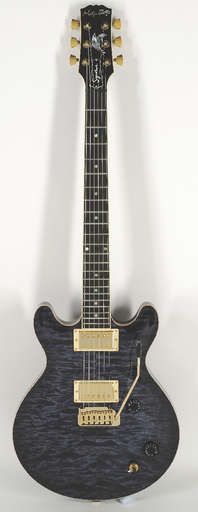Anyone who's kept an eye on the comings and goings within the music instrument industry over the last few decades will know that Martyn Booth worked for Gibson's UK repair department during the 1970s.
From there he went on to run his own successful repair business before designing the MSG range of guitars for Yamaha in the mid-eighties. There he created the MSG guitar, looking to combine the elegance of a 335 with the construction of a Les Paul.
Although it got a great response - the late great Alan Murphy was the model's prime champion - by the early nineties times were tough and Yamaha decided to cease production.
Come forward 10 years and Martyn has a successful repair operation in Suffolk, where his reputation as a craftsman and perfectionist keeps him busy looking after his roster of satisfied clients.
But the nagging desire - along with considerable pressure from MSG/ Image fans - to re-create and refine his original design to the boutique standards of PRS and co, has led to the models we see today.
Overview
This is perhaps more like the guitars for which Martyn Booth is best known, with its 5A quilted maple top under a translucent finish and fitted with a Hipshot non-locking vibrato.
While almost identical in construction and quality to its sister guitar, the Classic, this one has been chambered out for greater dynamics in the sound department.
Finished in nitro-cellulose, again the execution is faultless. Martyn likes to see a touch of sinking into the grain for a slightly more organic look to his guitars and that's fine by us - several other top makers prefer it too.
To accommodate the vibrato - which is reminiscent of the PRS system with its push-in arm - the Signature has been fitted with Sperzel locking tuners, a GraphTech nut and a narrower headstock with shallow 10-degree pitch for straighter string pull.
As with PRS, the whole guitar has been designed around the idea of tuneful vibrato - Martyn hasn't simply routed out the body of a Classic and slapped one in!
The edge of the Signature's top has been left natural for a sort of faux binding look - this time a nod in PRS's direction.
Neck and headstock are both bound in cream and the latter's fascia is adorned with a striking pair of leaping dolphins, designed and hand-cut by a local craftsman.
No lasers here: this is old-fashioned artisanship at its best. This instrument's neck is very slender. It makes for a delicate and precise feel.
Jumbo fretwire has been used here too and attention to detail is once again second to none. There's more of a rock feel to this neck and the vibrato system backs up that vibe perfectly. It's set up quite lightly and responds to every nuance, from Hank-style wobbles and Holdsworthian dips, up to Beckish gargles and full EVH dives. Tuning was never a problem, the system returning to pitch every time.
This neck is so fast. Action is low enough for tapping and yet there's still no fretbuzz, while all the bending and vibrato traits of the Signature's sister guitar apply too. It's a very different playing experience though, with this one for the rockers while the Classic is much more of a blueser.
Sounds
The Signature has a light nature overall. The Duncan Custom at the bridge is a less honky humbucker than the JB and sounds more open as a result. It's an articulate guitar and that's great when using the vibrato system - mushy tones become even more confused when whammied, so this is a definite plus.
There's plenty of poke here though, and you also know you're playing a humbucking guitar. Again, using the PRS comparison, this is more akin to a Custom 22 with its slightly less girthsome sound than the McCarty.
Time was when 'hand-made' meant 'home-made' when it came to British electric guitars. But since the late Sid Poole began his quest for hand-crafted perfection, others have picked up the baton, none with more success than Martyn Booth.
The build quality and playability of this guitar is as good as anything we've yet witnessed. The Signature, while happily owing to both Gibson and PRS, is a genuine British design that stands alongside anything in the world for quality and style.
That it plays and sounds as good as guitars built by the best names is testament to Booth's 30-year pedigree, his desire to be the best at what he does and his determination never to compromise on quality.
With that quality, of course, comes a price. But we believe this instrument is the equal of any US boutique guitar and so offers good value.

